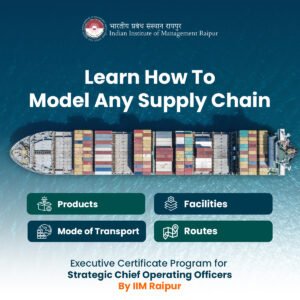Supply chain analytics has revolutionised the way businesses optimise their operations, enhance efficiency and meet customer demands. In this blog, we will explore the latest trends in supply chain analytics that are reshaping the industry.
If you’re interested in becoming a supply chain expert or enhancing your skills in this field, consider enrolling in a supply chain management course or pursuing relevant supply chain certifications.
Overview of Supply Chain Analytics
Supply chain analytics involves gathering and analysing data from various sources within the supply chain to gain insights and make informed decisions. This data-driven approach helps organisations streamline their processes, reduce costs, improve customer satisfaction and achieve a competitive edge.
Why is Supply Chain Analytics Important?
Supply chain analytics has become increasingly important due to the growing complexity of global supply chains. Companies need to leverage analytics to drive efficiency and profitability in their operations. By harnessing the power of data, organisations can:
1. Identify bottlenecks: Analytics allows companies to identify areas where the flow of goods or information is hindered.
2. Optimise inventory levels: Analytics helps companies determine the optimal inventory levels at different stages of the supply chain.
3. Enhance forecasting accuracy: Analytics leverages historical data, market trends and external factors to improve the accuracy of demand forecasts.
4. Mitigate risks: Analytics enables organisations to identify and mitigate potential risks in their supply chain by analysing data related to supplier performance, transportation delays, geopolitical factors and natural disasters.
5. Respond to market changes: Analytics provides real-time insights into customer preferences, market trends and competitor activities.
Now let’s delve into the six latest trends shaping supply chain analytics:

1. Artificial Intelligence (AI) and Predictive Analytics
-
AI-powered algorithms can analyse historical data patterns to predict future scenarios accurately.
-
From demand forecasting to inventory optimisation and route planning, AI enables organisations to make data-driven decisions proactively.
-
For example, in e-commerce logistics, AI algorithms can predict order cancellations or returns based on customer behaviour patterns.
2. Real-time Visibility and Insights
-
Real-time visibility across the entire supply chain is essential for effective decision-making.
-
With advanced technologies like IoT sensors and RFID tags, organisations can track goods throughout their journey right from production to delivery.
-
Real-time insights into inventory levels, transportation conditions and lead times enable agile decision-making and prompt responses to disruptions.
3. End-to-end Integration
-
To maximise operational efficiency and eliminate silos within the supply chain ecosystem, end-to-end integration is crucial.
-
By integrating various systems such as procurement, manufacturing, warehousing and transportation into a unified platform, organisations can optimise workflows, reduce redundancy and improve coordination.
4. Cloud-based Solutions
-
Cloud-based supply chain analytics platforms offer scalability, flexibility and cost-effectiveness.
-
They allow organisations to store and process large volumes of data securely while providing real-time access to stakeholders across the supply chain.
-
Cloud-based solutions also facilitate collaboration among suppliers, manufacturers, distributors and retailers for seamless information sharing.
5. Sustainability
-
With increasing focus on sustainability and environmental impact, supply chain analytics plays a vital role in optimising resource utilisation and reducing waste.
-
By analysing data related to energy consumption, emissions and carbon footprint along the supply chain network, organisations can identify areas for improvement and implement sustainable practices.
6. Collaboration
-
In today’s interconnected world, collaboration between supply chain partners is key to driving efficiency and meeting customer expectations.
-
Supply chain analytics fosters collaboration by providing shared visibility into inventory levels, demand patterns, production capacities and delivery schedules.
-
Collaborative planning helps align the entire supply chain ecosystem towards common objectives.
Accelerate Your Supply Chain Career
In conclusion, supply chain analytics is rapidly evolving with these latest trends. Organisations that embrace these advancements gain a competitive advantage by enhancing operational efficiency and responsiveness in dynamic markets.
If you’re interested in gaining expertise in supply chain analytics or pursuing a career in this field, Imarticus Learning offers comprehensive supply chain management courses and certifications that cover these latest trends.
Your journey towards becoming a proficient supply chain professional starts here and now. Consider enrolling in our Supply Chain Management Course. Don’t miss out on this chance to boost your career prospects! Visit our website to learn more about our courses.

